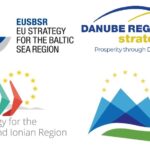
Project; ongoing
EUSDR Priority Area(s): PA 10 Institutional Capacity & Cooperation
The project takes a clear macro-regional approach. The aim is to improve the quality of life of care-dependent people in rural and urban areas of the Danube Region:
- by building innovation capacities on home- and community-based services
- and interregional cooperation between various public and private stakeholders
- supported by scientific monitoring.
Objectives:
Transformation
- Capacity building programmes: System Innovation Lab – three countries tackle challenges in the field of homecare on a systemic level; Accelerator – six countries foster development and scaling up of already existing products locally.
- Partnership Building.
Collaboration
- Transnational Innovative Programme: 10 transnational teams visit modules in five countries to develop new ideas for the homecare sector.
- Danube Policy Platform: A virtual workshop series, hosted by nine countries, enabling inspiration and exchange across borders
- Annual Summits: Events to present the project to the public
Scientific Evaluation
- Research Teams from three countries evaluate and provide consultation throughout the project (document in a policy paper).
Need and (expected) impact: The project Caring Communities focuses on community centred care services in the Danube Region, particularly home care, using digital tools to improve service delivery. The project addresses needs and challenges such as aging populations, staff shortages, and low digital integration in care. It aims to scale and transfer innovative care solutions across the Danube Region.
Macro-regional dimension: Project Partners include organisations from: Austria, Bosnia and Herzegovina, Bulgaria, Croatia, Germany, Hungary, Republic of Moldova, Romania, and Serbia.
Stakeholders involved: Ministries (Hungary, Germany, Republic of Moldova), Local Council (Romania), University (Bulgaria) and City Association (Croatia).
Budget and Funding: Volume: EUR 2 950 000; Co-financed by Interreg Danube Region Programme
Further information:




